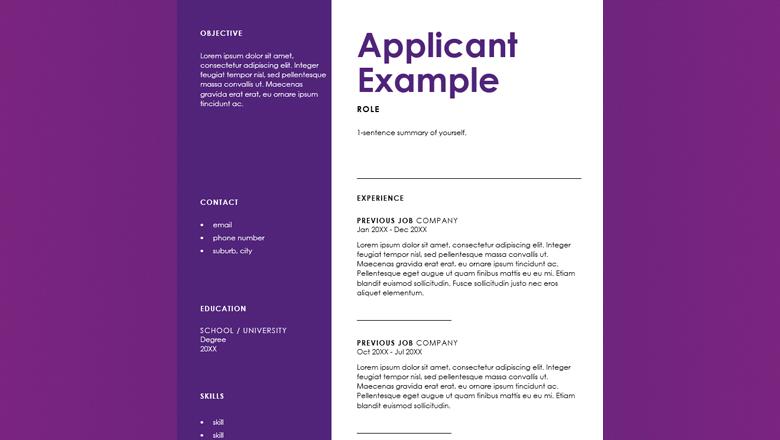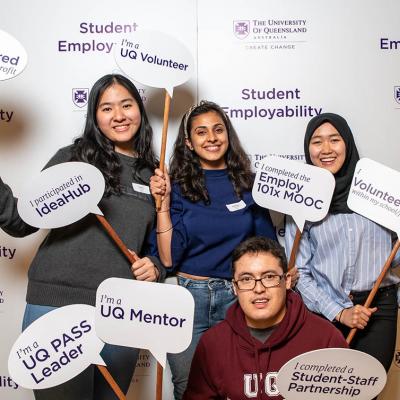Wondering how to make a resumé for your first job? We share our best resumé-writing tips with expert advice from a member of UQ's Student Enrichment and Employability Development team.
Is there anything more intimidating than a blank Word document?
Probably. But it’s pretty high on the list – especially when you need that doc to get you a job.
You have to:
- make a good first impression
- summarise your education and experience
- showcase your talents and abilities
- convince an employer you deserve an interview.
And you need to do all this with just one or two A4 pages.
Hey, nobody said it was easy. But it might not be as hard as it sounds. A couple of resumé-writing tips can help you turn that scary empty page into a CV* that gets you a job. (*We’ll be using ‘resumé’ and ‘CV’ interchangeably in this article).
We spoke with Madelaine-Marie Judd, Service Improvement Manager (Careers) at UQ, to compile this list of tips on what to put on a resumé for a first job and beyond.
1. Tailor your resumé to the job
A classic mistake people make is writing their first resumé and then just submitting it as is for each application. For a better chance of success, you should tailor your CV to suit the job description and match any keywords from the ad.
According to Madelaine-Marie, the first step is to review the duties and selection criteria to make sure you’re a good fit for the role.
“Ensure the roles and responsibilities that you detail in the Experience section align to these criteria,” she says.
“This shows the employer that you’re engaged and have an understanding of what they’re looking for – you!”
2. Structure your resumé with signposts

A clear, logical structure is vital for your CV. Your first resumé template should be clearly signposted, using subheadings (Education, Experience, Referees) to organise your content and guide the reader.
This is one of Madelaine-Marie’s top tips for writing your first resumé because a confusing layout means a potential employer won’t even read your details – no matter how good they are. Plus, if you get your structure right in your first resumé, you’ll have a great template to use for future versions.
3. Use full sentences
Don’t shy away from going into detail, even if you’re using dot points (which are great for structuring your CV, btw). This is particularly true for the Experience section of your resumé.
“Rather than just listing a couple of words to describe what you did in previous roles, include full sentences to describe the what and the why,” says Madelaine-Marie.
Here's an example on how to write your first resumé:
- Instead of Working in a team, you might say: “I adapted my work style to suit my co-workers and contributed to a positive team culture.”
- Instead of Roster management, you might say: “I coordinated the team’s work hours to ensure sufficient staffing at key times.”
- Instead of Customer service, you might say: “I ensured all customers were satisfied by being attentive, helpful and friendly at all times.”
This approach shows that you don’t just have the capabilities. You also understand how to use them and why they make you a valuable employee.
4. Be conscious of your design elements
If you’re a visual person, you might start with the layout of your resumé or spend a lot of time making it look good. And that’s great – a strong aesthetic can indeed help you stand out from the pool of candidates.
But be careful. Dedicating too much space to graphics can make it tough to include all your information.
“For some positions, there may be a cap of one or two pages for a resumé,” says Madelaine-Marie.
“You need to ensure you have enough space to convey the depth and range of experiences that have shaped you.”
It can take time to find the right balance between text and graphics. It’s also possible that your resumé will go through recruitment software that won’t translate your graphics properly. So, always prioritise making room for the details you need employers to know.
Did you know? You can purchase first resumé templates on websites like Etsy or Creative Market to give your CV that little extra something it needs to stand out in the crowd. You can also use free tools like Canva to create your own personal branding.
5. Don’t neglect your experience (even if it’s not work experience)

Since we’re looking at tips for writing your first resumé, we asked Madelaine-Marie what she would suggest for people who have limited work experience (or none at all).
Is there a way to compensate for not having many (or any) jobs on your CV?
Well, yes, there is.
Resumé-writing tips for students with no work experience
“One of the most common mistakes is not including valuable experiences such as extra-curricular activities in the Experience section,” says Madelaine-Marie.
“These types of activities are incredibly meaningful and help create a conversation starter during interviews.”
Once you’re in uni, there’s a whole world of extra-curricular activities you can explore that will look great on your CV:
- work-integrated learning placements
- student-staff partnership projects
- internships
- volunteering
- mentoring
- representing your uni as an ambassador.
But there are plenty of opportunities during high school too. Perhaps you’ve:
- represented your school at an external event
- been elected for a student leadership position
- participated in an academic club (e.g. debating)
- taken part in another extra-curricular activity that demonstrates your positive attitude and abilities.
Whatever these activities might be, include them.
“Employers understand and appreciate that experience can take shape in many different forms.”
Resumé-writing tips for students with some work experience
If you’ve had a paid casual job, don’t you dare leave it off your resumé – even if it doesn’t seem relevant to the jobs you want.
“Paid casual jobs, such as in hospitality or retail, are incredibly important to include in your resumé,” says Madelaine-Marie.
“There may not be a direct correlation between the job you’re seeking and your casual role. But this experience may demonstrate your ability to manage competing demands (study, extra-curricular and work) and work in a team environment. These are transferrable skills that are in demand in every industry.”
6. Ask a friend or family member to review it
Writing about yourself can be tough. You may forget to include attributes and skills that are obvious to the people who know you best. This is why asking a close friend or family member to peer-review your resumé is a great idea.
Make sure to share the specific job description with them, so they know what you’re applying for. Ask for constructive feedback/ideas for improvement and keep an open mind to their suggestions.
Your family member or friend may even provide the extra pair of eyes needed to spot a crucial typo (see resumé-writing tip #9 below).
7. Ask a mentor or teacher to review it

Your friend or family member is a great starting point for feedback, but they may not have the experience to pick up every important detail. This is where a trusted teacher or mentor can help. This person may be able to look more objectively at your draft and is less likely to hold back with their feedback.
If nobody comes straight to mind to fill this role for you, consider which of your teachers you might feel comfortable asking for their opinion.
Did you know? At UQ, we have a huge range of resources to help students tailor their resumé and cover letter to apply for a job. From checklists to tips and workshops, we're committed to helping our students land their dream job.
8. List your education and experience in reverse chronological order
This resumé-writing tip is obvious to some but not to everyone.
If you’re not quite sure, think of it this way: will your potential employer care more about what you’ve done in the last year or what you did three years ago?
Yep, exactly. Lead with your most recent awards, experiences and educational achievements. This helps your interviewer ask about the things you’ll remember in detail – and it gives them a clear picture of who you are today.
9. Pay attention to spelling and formatting
Look, you’re probably not applying to write articles for the UQ Study website (please don’t; the role is taken). But you should still take care with the spelling, grammar and formatting on your resumé – even if writing isn’t an explicit part of the role.
These aspects of your CV speak to your attention to detail, which is highly valued in any profession. While the reader might not necessarily appreciate if everything is correct and well-presented, they’ll almost certainly notice if you’ve misspelt their name or their business’s name, used the wrong ‘there’ or put no effort into formatting your text consistently.
So, spend 10 minutes after you’re done to check for typos and clean up your font sizes. It’s worth the extra time.
10. Don’t let your resumé stand alone
If you follow all nine of these tips for writing a good CV, you should end up with a solid resumé. But your resumé doesn’t want to do all the work for you – and it shouldn’t have to. It’s only one part of the overall application process.
A good application includes a cover letter that complements your resumé and sometimes a separate response to selection criteria. Even then, a resumé can only get you so far, no matter how amazing it is. You’ll need to be interview-ready to seal the deal as well.
Luckily, moving from high school to uni leads to heaps of opportunities to develop your dream career path. For example, at UQ, we have several teams dedicated to enhancing your employability. This includes having experts like Madelaine-Marie available to support and empower you to develop the capabilities required to navigate the working world.
If you join us to study, we look forward to supporting you in enhancing your employability. In the meantime, we hope these top tips for resumé-writing have helped you show that blank Word document who’s boss.
Looking for more tips and tricks on how you can increase your employability and map out a clear career path while studying? Read up on how you can prepare for your future career at UQ.





